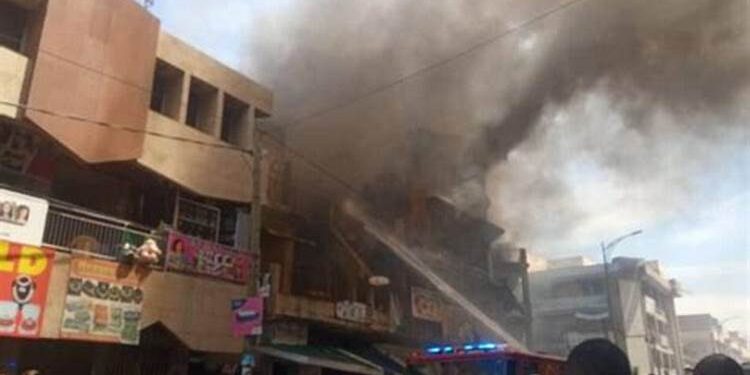The Nyumba Kuubwa building fire in downtown Kampala is not merely an unfortunate incident—it is a glaring testament to Uganda’s chronic institutional failures. While flames engulf belongings and livelihoods, the government’s incompetence and gross negligence are the true accelerants of this disaster.
This inferno, reportedly ignited in a chemical storage unit, underscores a longstanding issue: Kampala’s lack of regulatory enforcement. The question is not why this happened, but how the government has allowed such ticking time bombs to fester in the heart of its capital. Who permits the storage of volatile chemicals in densely populated urban buildings? Why do safety protocols exist only in dusty policy documents, never reaching implementation? This is not an isolated case of bad luck; it is a calculated failure by a corrupt, indifferent system.
President Museveni and his cronies have continuously prioritized their own pockets over the safety of Ugandans. The National Building Review Board, tasked with ensuring structural integrity and compliance, has become another toothless, underfunded agency incapable of enforcing its mandate. Meanwhile, the Kampala Capital City Authority (KCCA) sits idly by, issuing permits to the highest bidder without verifying adherence to safety regulations. The result? Lives and livelihoods reduced to ashes while officials point fingers and issue hollow statements of concern.
The firefighting response to this disaster highlights another failure: the deplorable state of Uganda’s emergency services. The underfunded and poorly equipped fire brigade scrambled to contain a blaze that could have been mitigated with proper prevention measures. In a city as bustling and vulnerable as Kampala, the lack of fire hydrants, functional equipment, and trained personnel is not just shameful—it is criminal. How many more lives must be lost before the government invests in a modernized, efficient emergency response system?
Let us also examine the Ministry of Internal Affairs and its role in disaster preparedness. Year after year, its budget is plundered, with funds redirected to enrich Museveni’s inner circle or bolster his security apparatus. Billions are squandered on tear gas and anti-riot gear to suppress dissent, yet there is no investment in public safety infrastructure. These misplaced priorities reveal the regime’s contempt for ordinary Ugandans, who are left to fend for themselves in times of crisis.
The Nyumba Kuubwa tragedy should also serve as a wake-up call for Kampala residents. The unchecked construction of substandard, overcrowded buildings in areas like Arua Park poses a constant risk. But what options do citizens have when the government fails to regulate and provide alternatives? The people are forced into dangerous environments by the very leadership meant to protect them.
As investigations proceed, do not expect accountability. In Museveni’s Uganda, blame will likely fall on a low-level scapegoat, shielding those truly responsible. This cycle of negligence, disaster, and impunity will persist unless Ugandans demand more than performative outrage and hollow promises.
The Nyumba Kuubwa fire is not just a tragic accident; it is a damning indictment of Uganda’s decayed governance. The flames may be extinguished, but the anger, grief, and demand for justice must continue to burn until meaningful change is achieved.







Discussion about this post